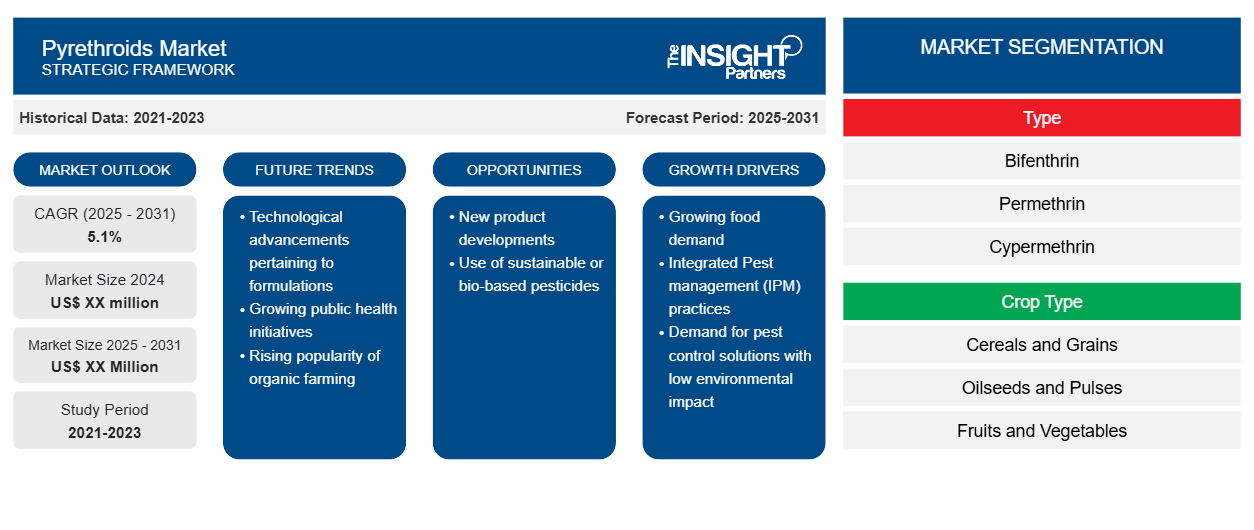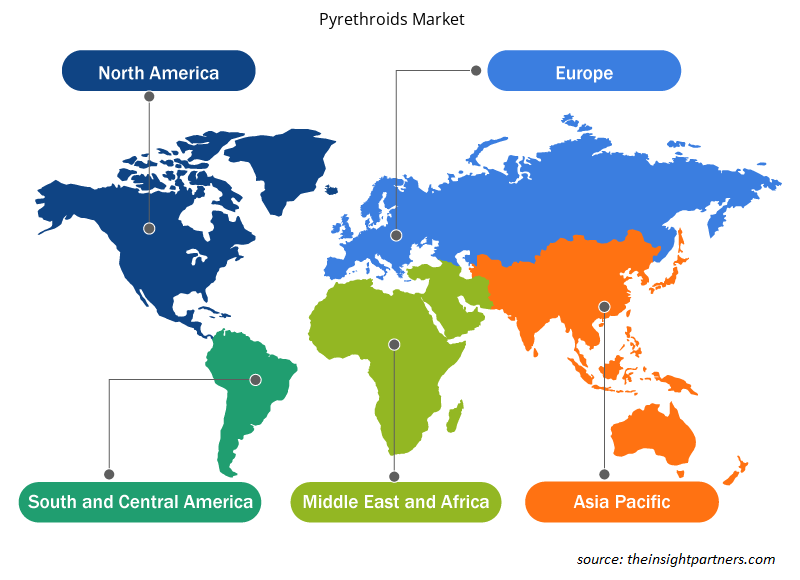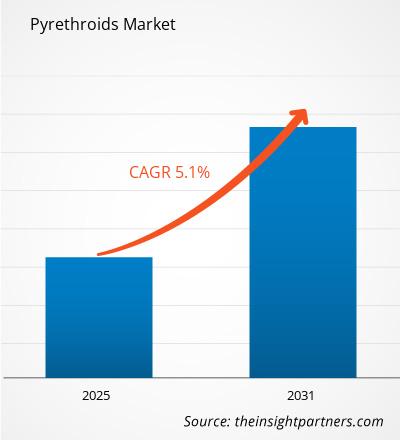The Pyrethroids Market is expected to register a CAGR of 5.1% from 2025 to 2031, with a market size expanding from US$ XX million in 2024 to US$ XX Million by 2031.
The report is segmented by type (bifenthrin, permethrin, cypermethrin, deltamethrin, cyfluthrin, lambda-cyhalothrin, and others). The report is further segmented by crop type (cereals and grains, oilseeds and pulses, fruits and vegetables, and others). The report scope covers five regions: North America, Europe, Asia Pacific, Middle East and Africa, and South and Central America and key countries under each region. The global analysis is further broken down at the regional level and major countries. The Report Offers the Value in USD for the above analysis and segments.
Purpose of the Report
The report Pyrethroids Market by The Insight Partners aims to describe the present landscape and future growth, top driving factors, challenges, and opportunities. This will provide insights to various business stakeholders, such as:
- Technology Providers/Manufacturers: To understand the evolving market dynamics and know the potential growth opportunities, enabling them to make informed strategic decisions.
- Investors: To conduct a comprehensive trend analysis regarding the market growth rate, market financial projections, and opportunities that exist across the value chain.
- Regulatory bodies: To regulate policies and police activities in the market with the aim of minimizing abuse, preserving investor trust and confidence, and upholding the integrity and stability of the market.
Pyrethroids Market Segmentation
Type
- Bifenthrin
- Permethrin
- Cypermethrin
- Deltamethrin
- Cyfluthrin
- Lambda-cyhalothrin
Crop Type
- Cereals and Grains
- Oilseeds and Pulses
- Fruits and Vegetables
You will get customization on any report - free of charge - including parts of this report, or country-level analysis, Excel Data pack, as well as avail great offers and discounts for start-ups & universities
Pyrethroids Market: Strategic Insights

- Get Top Key Market Trends of this report.This FREE sample will include data analysis, ranging from market trends to estimates and forecasts.
Pyrethroids Market Growth Drivers
- Growing food demand: The growing population has set greater demands on the global agricultural industries to meet food demands. Pyrethroids are synthetic pesticides from pyrethrins used to control pests, and their demand has been attributed to their use in fighting a wide range of pests, including insects destroying crops. As agriculture increases to produce more food, crop protection solutions, such as pyrethroids, are also increasing.
- Integrated Pest management (IPM) practices: There is a trend of moving toward integrated pest management (IPM) globally, focusing more on the usage of several control methods, both biological, cultural, mechanical, and chemical solutions. Pyrethroids are increasingly used in various IPM programs based on this chemical control strategy as these have relatively low toxicity to humans and animals but a high degree of efficacy against a wide range of pests, thus propelling this demand for pyrethroid-based products due to the increasing adoption of IPM within agriculture and horticulture.
- Demand for pest control solutions with low environmental impact: Increasingly, both consumers and regulators are seeking more environmentally friendly pest control solutions. Pyrethroids are favored because of their relatively lower environmental persistence and fast degradation rate in soil and water. As the requirements for chemical pesticide usage become stricter, safer alternatives, such as pyrethroids, are gaining demand from both the agriculture and public health sectors.
Pyrethroids Market Future Trends
- Technological advancements pertaining to formulations: The advancement of formulation technology has improved the efficiency and safety of pyrethroid-based products. Innovations, such as slow-release formulations and nano-encapsulation, allow better control over the application of pyrethroids. Thus, innovations are gradually making pyrethroids more attractive for both agricultural producers and pest control professionals, thereby enhancing the market's growth prospects.
- Growing public health initiatives: There is an increase in the use of pyrethroids in public health pest control, especially in combating malaria, dengue, and Zika virus vector-borne diseases. Their prevalence is higher in tropical and subtropical regions, thereby increasing government spending on various public health initiatives, including the application of pyrethroids for mosquito control. This subsequently leads to an increased demand for pyrethroid-based insecticides in public health applications.
- Rising popularity of organic farming: With the boom in organic farming and sustainability movements, focus on minimizing or eliminating harmful pest control practices has been on the increase. Regarded as fully organic, pyrethroids are still safer than most other chemical insecticides. In this regard, they have shown the same favor in organic and sustainable agriculture as others.
Pyrethroids Market Opportunities
- New product developments: There exists an increasing chance of the development of new pyrethroid variants that are more effective in dealing with resistant pests. Owing to the development of pest resistance to older insecticides, the creation of next-generation pyrethroid formulations has become essential for overcoming these challenges. This opens ways to innovation and new lines of products in the market, allowing companies to differentiate themselves and capture market share.
- Use of sustainable or bio-based pesticides: Governments and environmental agencies worldwide are gaining momentum in supporting the use of biopesticides and sustainability-based pest control solutions. Pyrethroids, being one of the relatively safer chemical alternatives versus the traditional insecticides, are likely to gain from these regulations. In this respect, market players can leverage this trend by developing solutions that are pyrethroid-based and align with the sustainability criteria, taking benefit of policy support as well as market incentives in environments where the environmental regulations are stronger.
Pyrethroids Market Regional Insights
The regional trends and factors influencing the Pyrethroids Market throughout the forecast period have been thoroughly explained by the analysts at The Insight Partners. This section also discusses Pyrethroids Market segments and geography across North America, Europe, Asia Pacific, Middle East and Africa, and South and Central America.

- Get the Regional Specific Data for Pyrethroids Market
Pyrethroids Market Report Scope
| Report Attribute | Details |
|---|---|
| Market size in 2024 | US$ XX million |
| Market Size by 2031 | US$ XX Million |
| Global CAGR (2025 - 2031) | 5.1% |
| Historical Data | 2021-2023 |
| Forecast period | 2025-2031 |
| Segments Covered |
By Type
|
| Regions and Countries Covered | North America
|
| Market leaders and key company profiles |
Pyrethroids Market Players Density: Understanding Its Impact on Business Dynamics
The Pyrethroids Market is growing rapidly, driven by increasing end-user demand due to factors such as evolving consumer preferences, technological advancements, and greater awareness of the product's benefits. As demand rises, businesses are expanding their offerings, innovating to meet consumer needs, and capitalizing on emerging trends, which further fuels market growth.
Market players density refers to the distribution of firms or companies operating within a particular market or industry. It indicates how many competitors (market players) are present in a given market space relative to its size or total market value.
Major Companies operating in the Pyrethroids Market are:
- Adama Ltd.
- BASF SE
- Endura
- Ipcs Inchem
- PubChem
Disclaimer: The companies listed above are not ranked in any particular order.

- Get the Pyrethroids Market top key players overview
Key Selling Points
- Comprehensive Coverage: The report comprehensively covers the analysis of products, services, types, and end users of the Pyrethroids Market, providing a holistic landscape.
- Expert Analysis: The report is compiled based on the in-depth understanding of industry experts and analysts.
- Up-to-date Information: The report assures business relevance due to its coverage of recent information and data trends.
- Customization Options: This report can be customized to cater to specific client requirements and suit the business strategies aptly.
The research report on the Pyrethroids Market can, therefore, help spearhead the trail of decoding and understanding the industry scenario and growth prospects. Although there can be a few valid concerns, the overall benefits of this report tend to outweigh the disadvantages.
Frequently Asked Questions
What is the future trend for pyrethroids market?
Increased use in public health pest control is expected to be the key market trends.
What are the deliverable formats of the pyrethroids market?
The report can be delivered in PDF/Word format, we can also share excel data sheet based on request.
Which regions are covered in the report?
On the basis of geography, the pyrethroids market is classified into North America, Europe, Asia Pacific, Middle East and Africa, and South and Central America
What are the key players operating in the pyrethroids market?
FMC Corp, Bayer AG, UPL Ltd, Sumitomo Chemical Co Ltd, Syngenta Group, Nufarm Ltd, ADAMA Ltd, BASF SE, DuPont de Nemours Inc, and AMVAC Chemical Corp
What are the driving factors impacting the pyrethroids market?
The major factors driving the pyrethroids market are:
1. Rising Demand for Crop Protection.
2. Shift Toward Integrated Pest Management (IPM).
What is the expected CAGR of the Pyrethroids Market?
The Pyrethroids Market is estimated to witness a CAGR of 5.1% from 2023 to 2031
- Historical Analysis (2 Years), Base Year, Forecast (7 Years) with CAGR
- PEST and SWOT Analysis
- Market Size Value / Volume - Global, Regional, Country
- Industry and Competitive Landscape
- Excel Dataset
Testimonials
Reason to Buy
- Informed Decision-Making
- Understanding Market Dynamics
- Competitive Analysis
- Identifying Emerging Markets
- Customer Insights
- Market Forecasts
- Risk Mitigation
- Boosting Operational Efficiency
- Strategic Planning
- Investment Justification
- Tracking Industry Innovations
- Aligning with Regulatory Trends
Yes! We provide a free sample of the report, which includes Report Scope (Table of Contents), report structure, and selected insights to help you assess the value of the full report. Please click on the "Download Sample" button or contact us to receive your copy.
Absolutely — analyst assistance is part of the package. You can connect with our analyst post-purchase to clarify report insights, methodology or discuss how the findings apply to your business needs.
Once your order is successfully placed, you will receive a confirmation email along with your invoice.
• For published reports: You’ll receive access to the report within 4–6 working hours via a secured email sent to your email.
• For upcoming reports: Your order will be recorded as a pre-booking. Our team will share the estimated release date and keep you informed of any updates. As soon as the report is published, it will be delivered to your registered email.
We offer customization options to align the report with your specific objectives. Whether you need deeper insights into a particular region, industry segment, competitor analysis, or data cut, our research team can tailor the report accordingly. Please share your requirements with us, and we’ll be happy to provide a customized proposal or scope.
The report is available in either PDF format or as an Excel dataset, depending on the license you choose.
The PDF version provides the full analysis and visuals in a ready-to-read format. The Excel dataset includes all underlying data tables for easy manipulation and further analysis.
Please review the license options at checkout or contact us to confirm which formats are included with your purchase.
Our payment process is fully secure and PCI-DSS compliant.
We use trusted and encrypted payment gateways to ensure that all transactions are protected with industry-standard SSL encryption. Your payment details are never stored on our servers and are handled securely by certified third-party processors.
You can make your purchase with confidence, knowing your personal and financial information is safe with us.
Yes, we do offer special pricing for bulk purchases.
If you're interested in purchasing multiple reports, we’re happy to provide a customized bundle offer or volume-based discount tailored to your needs. Please contact our sales team with the list of reports you’re considering, and we’ll share a personalized quote.
Yes, absolutely.
Our team is available to help you make an informed decision. Whether you have questions about the report’s scope, methodology, customization options, or which license suits you best, we’re here to assist. Please reach out to us at sales@theinsightpartners.com, and one of our representatives will get in touch promptly.
Yes, a billing invoice will be automatically generated and sent to your registered email upon successful completion of your purchase.
If you need the invoice in a specific format or require additional details (such as company name, GST, or VAT information), feel free to contact us, and we’ll be happy to assist.
Yes, certainly.
If you encounter any difficulties accessing or receiving your report, our support team is ready to assist you. Simply reach out to us via email or live chat with your order information, and we’ll ensure the issue is resolved quickly so you can access your report without interruption.















1. Adama Ltd.
2. BASF SE
3. Endura
4. Ipcs Inchem
5. PubChem
6. Sigma-Aldrich
7. Sumitomo Chemical Co., Ltd.
8. Syngenta AG
9. The Jhaver Group
10. V.K.A Polymers Pvt. Ltd.






 Get Free Sample For
Get Free Sample For